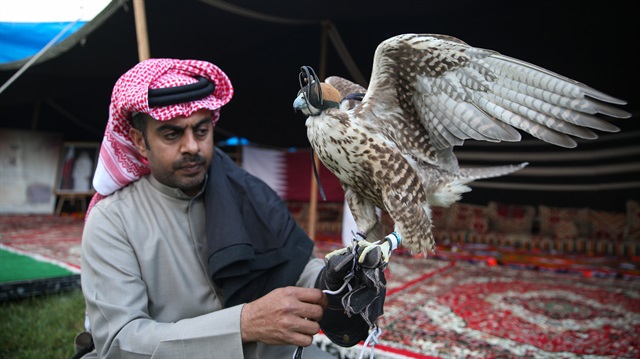
Festival sponsored by Anadolu Agency in Istanbul spotlights ‘historic sport for the people of Qatar’
Falcons from Qatar are drawing amazed stares at the third annual Ethnosport Cultural Festival in Istanbul.
Organized by the World Ethnosports Federation and sponsored by Anadolu Agency, the event aims to promote traditional sports and serve as preparation for the Olympics and allow many talented athletes to shine.
Arriving from the Gulf nation of Qatar, the falcons, which hold a place of pride in the Arab world, are being shown for the first time in Turkey as part of the festival.
In the competition, the falcons will try to reach prey located 400 meters or 800 meters away as fast as they can.
A Qatar tent was also set up to give visitors the opportunity to try out Qatari tea and coffee and take photos of the two falcons at the festival.
Speaking to Anadolu Agency, Ali bin Khatem al-Mehshadi, chair of the Qatari Society of Al-Gannas, said that falcons aren’t just used for aerial feats, but are an important part of Qatar’s history.
Al-Mehshadi said they came to Turkey at the invitation of World Ethnosports Federation President Bilal Erdogan.
“We bring you the compliments of the Qatari emir and the people. The people of Qatar and Turkey are brothers, so we are very happy, very excited,” said al-Mehshadi.
He added: “We have seen that the festival organized in Turkey is very large. The falcons were also the center of interest. We want to support our Turkish brothers and take part in this organization all the time.”
“Falcons are an important part of our culture… Some 70 percent of the people in Qatar are doing this sport and are interested. The sport of falconry is a historical sport for the people of Qatar. The falcon is the symbol of Qatar. So we constantly organize festivals and contests and give out big prizes,” he said.
Al-Mehshadi also said that while the prices of falcons vary greatly, the most expensive and valuables ones are white “because their hunting performance is very high.”
“Qataris love falcons. We brought one white and one normal falcon here,” he added.
The five-day festival in Istanbul’s Yenikapi Square is reviving celebrations indigenous to the Turkic world, Central Asia, and Anatolia.
Hello, the comments you share on our site are a valuable resource for other users. Please respect other users and different opinions. Do not use rude, offensive, derogatory, or discriminatory language.
The floor is all yours.








